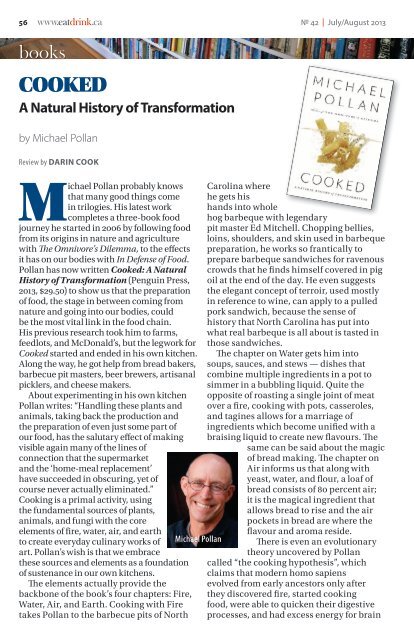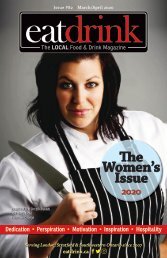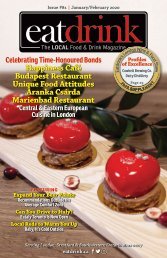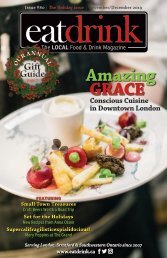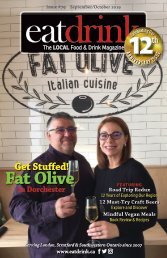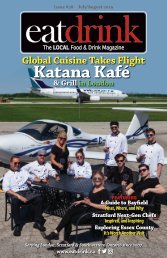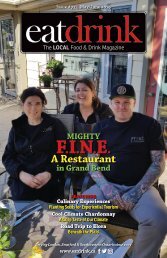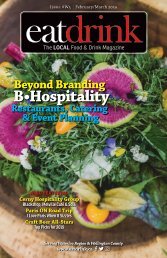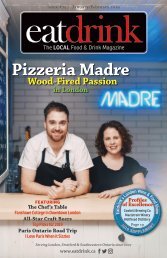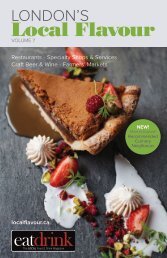Eatdrink #42 July/August 2013
The LOCAL food and drink magazine serving London, Stratford and Southwestern Ontario since 2007
The LOCAL food and drink magazine serving London, Stratford and Southwestern Ontario since 2007
You also want an ePaper? Increase the reach of your titles
YUMPU automatically turns print PDFs into web optimized ePapers that Google loves.
56 www.eatdrink.ca<br />
№ 42 | <strong>July</strong>/<strong>August</strong> <strong>2013</strong><br />
books<br />
COOKED<br />
A Natural History of Transformation<br />
by Michael Pollan<br />
Review by Darin Cook<br />
Michael Pollan probably knows<br />
that many good things come<br />
in trilogies. His latest work<br />
completes a three-book food<br />
journey he started in 2006 by following food<br />
from its origins in nature and agriculture<br />
with The Omnivore’s Dilemma, to the effects<br />
it has on our bodies with In Defense of Food.<br />
Pollan has now written Cooked: A Natural<br />
History of Transformation (Penguin Press,<br />
<strong>2013</strong>, $29.50) to show us that the preparation<br />
of food, the stage in between coming from<br />
nature and going into our bodies, could<br />
be the most vital link in the food chain.<br />
His previous research took him to farms,<br />
feedlots, and McDonald’s, but the legwork for<br />
Cooked started and ended in his own kitchen.<br />
Along the way, he got help from bread bakers,<br />
barbecue pit masters, beer brewers, artisanal<br />
picklers, and cheese makers.<br />
About experimenting in his own kitchen<br />
Pollan writes: “Handling these plants and<br />
animals, taking back the production and<br />
the preparation of even just some part of<br />
our food, has the salutary effect of making<br />
visible again many of the lines of<br />
connection that the supermarket<br />
and the ‘home-meal replacement’<br />
have succeeded in obscuring, yet of<br />
course never actually eliminated.”<br />
Cooking is a primal activity, using<br />
the fundamental sources of plants,<br />
animals, and fungi with the core<br />
elements of fire, water, air, and earth<br />
to create everyday culinary works of<br />
art. Pollan’s wish is that we embrace<br />
these sources and elements as a foundation<br />
of sustenance in our own kitchens.<br />
The elements actually provide the<br />
backbone of the book’s four chapters: Fire,<br />
Water, Air, and Earth. Cooking with Fire<br />
takes Pollan to the barbecue pits of North<br />
Michael Pollan<br />
Carolina where<br />
he gets his<br />
hands into whole<br />
hog barbeque with legendary<br />
pit master Ed Mitchell. Chopping bellies,<br />
loins, shoulders, and skin used in barbeque<br />
preparation, he works so frantically to<br />
prepare barbeque sandwiches for ravenous<br />
crowds that he finds himself covered in pig<br />
oil at the end of the day. He even suggests<br />
the elegant concept of terroir, used mostly<br />
in reference to wine, can apply to a pulled<br />
pork sandwich, because the sense of<br />
history that North Carolina has put into<br />
what real barbeque is all about is tasted in<br />
those sandwiches.<br />
The chapter on Water gets him into<br />
soups, sauces, and stews — dishes that<br />
combine multiple ingredients in a pot to<br />
simmer in a bubbling liquid. Quite the<br />
opposite of roasting a single joint of meat<br />
over a fire, cooking with pots, casseroles,<br />
and tagines allows for a marriage of<br />
ingredients which become unified with a<br />
braising liquid to create new flavours. The<br />
same can be said about the magic<br />
of bread making. The chapter on<br />
Air informs us that along with<br />
yeast, water, and flour, a loaf of<br />
bread consists of 80 percent air;<br />
it is the magical ingredient that<br />
allows bread to rise and the air<br />
pockets in bread are where the<br />
flavour and aroma reside.<br />
There is even an evolutionary<br />
theory uncovered by Pollan<br />
called “the cooking hypothesis”, which<br />
claims that modern homo sapiens<br />
evolved from early ancestors only after<br />
they discovered fire, started cooking<br />
food, were able to quicken their digestive<br />
processes, and had excess energy for brain


